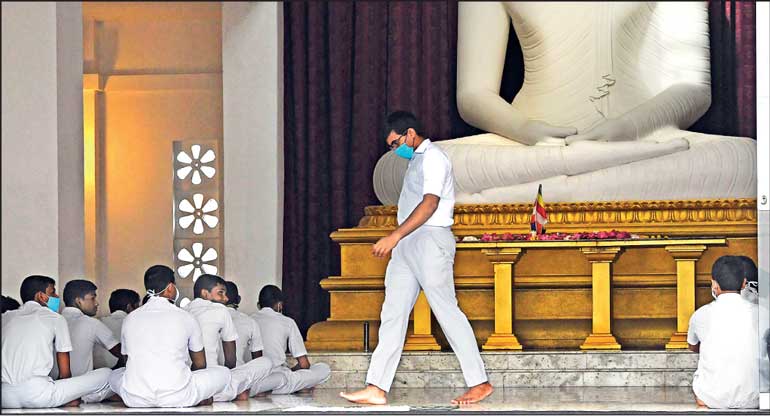Thursday Feb 19, 2026
Thursday Feb 19, 2026
Saturday, 30 October 2021 00:00 - - {{hitsCtrl.values.hits}}

How will we unmask our masks and redeem ourselves from abject hypocrisy? Probably by reverting to the values of the ancient Gurukula and Pirivena system of education that ancient Sinhala and Tamil societies was endowed with – Pic by Shehan Gunasekara
|
By Surya Vishwa
Human beings are not machines that should memorise theory and then blindly apply that theory as practice even when the circumstances and real life experience disproves these theories.
In the modern world it is no secret that modern so-called brainwashing euphemistically referred to as ‘education’ is the basis of every evil we have done to the planet beginning with so-called ‘scientific’ chemical, modern ‘technology’ that has among a plethora of ills have flooded the world with non-biodegradable products and the modern ‘professions’ which was teaching, to medicine, to law, to diplomacy or business is ‘taught’ in universities to be monetary ladders that is placed on the spine of humanity; crushing it to death.
Modern education bestowed by cultures which considered themselves superior based on colour and their so-called ‘developed’ state, is today the single most factor why we have killed the planet by replacing the concepts of ‘wellbeing’ and self sufficiency of ancient societies and replaced that with the bamboozled term ‘development’ which no one seems to call by its true name; ‘death.’
Quite ironically we also have the word ‘sustainable’ roped in and we are supposed to do as told with regard to what we are supposed to do with ‘sustainability’ and what goals we are supposed to have in this regard concerning our ‘development’.
Thus, we who have forsaken the wisdom of our ancestors, the lifestyle and wisdom of our ancestors are looking to various gurus of sustainability and they have even made a theory of it; just as in the case of the concept ‘peacebuilding’ or ‘reconciliation’.
How will we unmask our masks and redeem ourselves from abject hypocrisy? Probably by reverting to the values of the ancient Gurukula and Pirivena system of education that ancient Sinhala and Tamil societies was endowed with.
If we teach introspection and contemplation to Sri Lankans, first to the parents and then the teachers and the university academics and finally the school and university students, we would be able to probably genuinely and without unnecessary tamasha reach the sustainable development goals that were the hallmark of the ancient Sinhala civilisation.
Today we equate even the mere mention of the term Sinhala civilisation with the brainwashed idea that it equals communalism. In fact we will once and for all end communalism or racism if we look at contemplating on the basic fact that the ancient Sinhala kings of Lanka were the most progressive of global leaders. They were not corrupt. They were not petty. They did not put one set of people against another for tinsel gain. And for the entire history of Sri Lanka there is only one so-called ‘ethnic war’; that of Elara and Dutugemunu.
If a proper introspection is encouraged by Sri Lanka in its education system we will learn not to allow diverse power manipulation that currently takes place in this globalised world through which the first casualty is the people of Lanka.
We today think that declaring that Sri Lanka is not a Sinhala Buddhist nation is the fashionable way to go where the ideal ‘model’ of national unity is concerned. However a careful contemplation and introspection on the lines of the ethic of the Kesamutti Sutta, also known as the Kalama Suthraya, would show us that indeed Sri Lanka being honestly followed as a Buddhist nation would be its redemption.
The fact remains that the word ‘Sinhale’ or ‘Thun Sinhale’ were terms that cannot be interpreted as words that spell communalism because if history is correctly understood as those of the stature of Prof. Nimal de Silva could explain with minute examples from Sri Lanka’s ancient history, ‘Sinhale’ was the concept of the country that encompassed anyone who arrived here which is how we have the current-day Catholics, Malays and Moors.
Introspection and contemplation which required time and effort of the mind and the will of the heart, thus is a dire need that should be integrated to our education that would save the humane being in us. If so, we could probably see a day when our very soil is not abused and tortured and betrayed for a mess of porridge. If we have introspection and contemplation incorporated to our educational system we could probably see a time frame when we have political leaders emerging from such a holistic and truly Buddhistic education framework who will become leaders and not leeches.
(Surya Vishwa is a practitioner promoting humanism, nature, integrated knowledge and intangible cultural heritage. She has for the past year, every week consistently written in the Lankan English language print media on the importance of Sri Lankan policymakers prioritising indigenous medicine of Sri Lanka to be used for controlling the current COVID19 pandemic.)